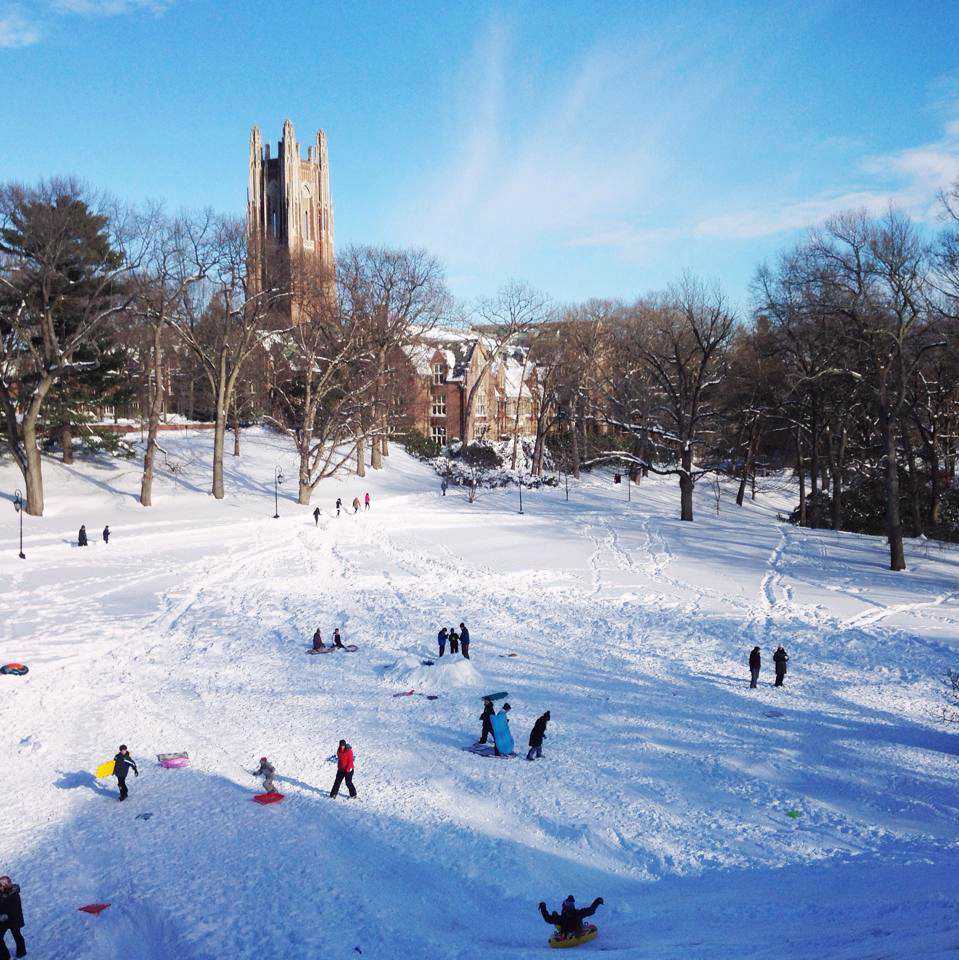The arrival of the roaring snowstorm Neptune last weekend was the latest in a series of severe storm systems to slam New England this month. A major snowstorm has hit the Boston area every week since the start of the Spring 2015 semester, leading Boston to break a number of snowfall records. Snowstorms Juno and Marcus made the list of the top 10 heaviest Boston snowstorms of all time. In fact, February 2015 is a mere inch away from becoming Boston’s snowiest February in history.
However, this record-breaking snow has caused problems: snow drifts in Wellesley have swallowed up bushes, bike racks and even mailboxes. The wind chill has occasionally dipped below a frigid -30 degrees, a temperature at which people can catch frostbite in as little as 10 minutes. During the blizzards themselves, whiteout conditions reduce visibility to less than a quarter of a mile, and strong winds combined with quick snowfall render any kind of travel treacherous.
In response to these conditions, Wellesley College declared three snow days during the past three weeks, closing academic buildings and libraries. During the snow days, groups of intrepid students trekked to Severance Green armed with dining hall trays, ready to sled down the hill. Paper coffee cups disappeared at an exponential rate as students flocked to the dining halls for warm beverages. Students finished problem sets and binge-watched Netflix shows like House of Cards and Downton Abbey with equal gusto.
A few brave souls even ventured into Boston during the storms. Nina-Marie Amadeo ’18 visited Northeastern University on Jan. 26 to hear Laverne Cox, an acclaimed actress and LGBTQ advocate who stars as Sophia Burset on the show “Orange is the New Black,” testify about her journey to womanhood as a transgender woman of color.
“It was an amazing experience, and I’m thrilled I decided to brave the cold and go… But I did end up stuck there for two nights!” Amadeo said.
Luckily for Amadeo, a Northeastern friend hosted her for those two nights. Despite the hassle associated with finding a place to stay during the storm and arranging for transportation back to Wellesley, Amadeo does not regret traveling all the way to Boston to listen to Laverne Cox.
Meanwhile, faculty members like Professor Akila Weerapana used the snow days as an opportunity to spend some time with their children and families.
“My kids have been great. They enjoy sleeping in, [taking] one trip out to play in the snow and then coming in to drink hot chocolate and spending the rest of the time enjoying indoor activities,” Weerapana said, sharing the enthusiasm of many professors.
Professor Katie Goodall was greeted with a pleasant sight when she came home from Wellesley after lecturing.
“I found my husband throwing our one-year-old daughter into the snowbank, feet first. She was all bundled up, but from under all of her layers we could hear her little giggle. At the end, the snowbank was pock-marked with a series of toddler-sized potholes,” Goodall said.
After the snowfall died down, school was back in session. Wellesley students and professors faced a new challenge: how to adapt to the scheduling problems caused by the snow days in a timely fashion. This dilemma was complicated by the fact that the semester had just started and everything from material to organizational meetings had to somehow be made up.
In some cases, the problem of making up lost time could be fixed relatively quickly. Wellesley’s five societies rescheduled their teas for after the snow days, in accordance with students’ schedules. Some organizational meetings and college events were rescheduled, and others like CWS’ Bootcamp for juniors and seniors, were canceled.
Many professors already had snow days built into their schedules due to their extensive experience with New England’s notorious winter weather.
Weerapana emphasizes that because the snow days happened during the early portion of the semester, it was easier to make adjustments to the syllabus. However, he added extra office hours to help accommodate his students’ needs.
“I was able to move things around. My problem sets moved from being at the end of the week to the beginning, my exams were pushed back, but other than that it was easier than if I lost a week in the middle [of the semester] — which may still happen!” Weerapana said.
Goodall responded to the scheduling challenges by giving her horticulture students access to additional online lectures and continuing to engage in discussions on the class’s Google Plus page.
She was able to ease her commute from the other side of Lake Waban by skiing to her lectures.
“It’s gorgeous out, and the physical activity helps to settle my mind and organize my thoughts. Last Monday, because the snow was so heavy, my skiing took longer than usual. I stopped on the trail and emailed my 8:30 Environmental Horticulture class that I was skiing in and I might be a few minutes late. When I walked through the door at 8:35 covered in snow, skis in hand, they just about cheered. We were all troopers that day, and I was happy so many of them had trudged across campus to attend class,” remarked Goodall, who encourages all interested Wellesley students to ski around Lake Waban and to class if possible.
Many who hail from snow-deprived regions like the southern United States would describe the calmness and beauty of the snow as surreal. Goodall, a native Floridian who has lived on the East Coast for several years, sums it up perfectly.
“Winter is still somewhat magical to me,” Goodall said.
Photo courtesy of Julie Rong ’16






